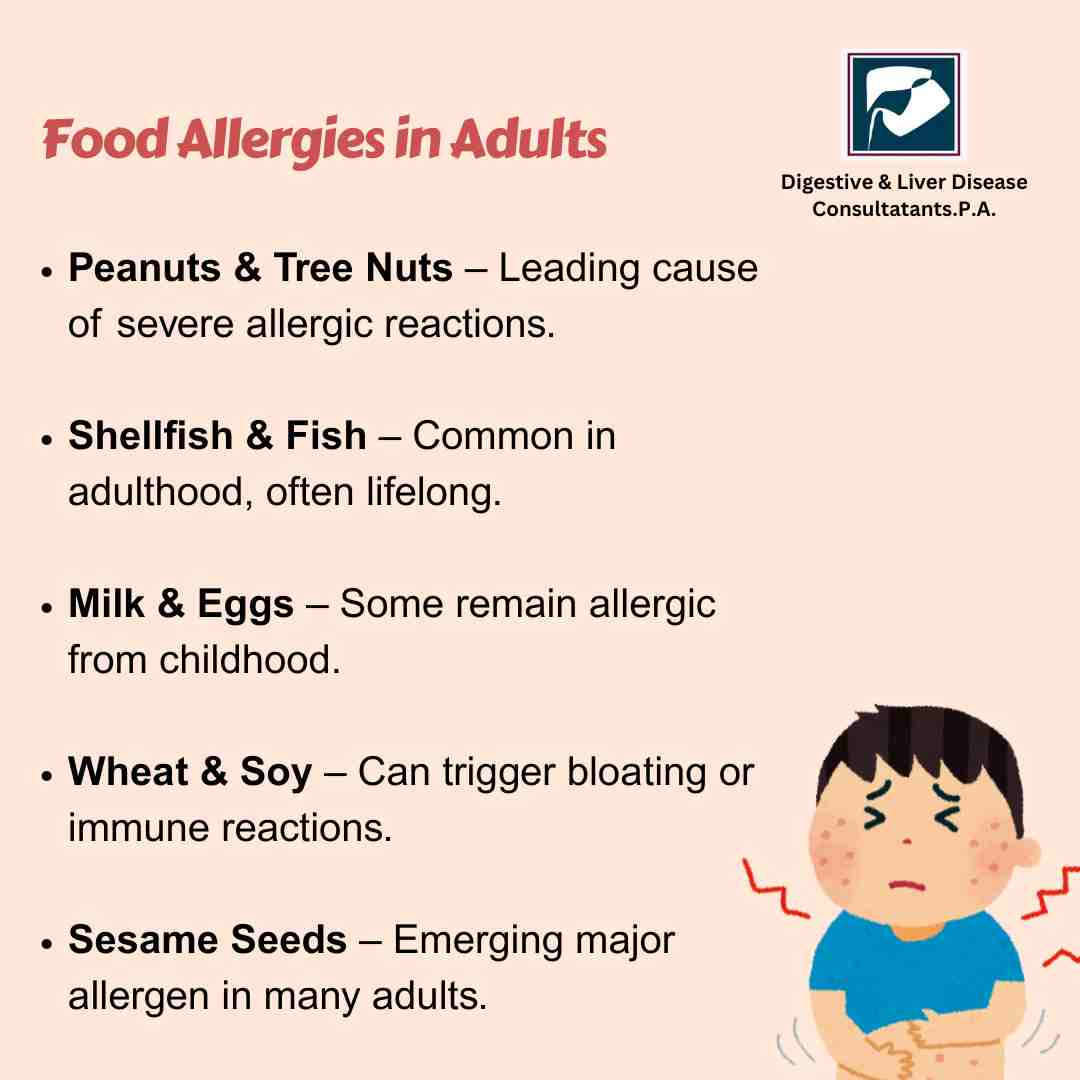Food allergies aren’t just a childhood problem. Many adults also experience allergic reactions to foods they’ve eaten for years without issue. In fact, millions of adults in the U.S. live with food allergies that can cause uncomfortable or even life-threatening symptoms. Understanding which foods are most likely to cause allergic reactions and how to manage them is key to staying healthy and avoiding unnecessary risks.
In this blog, we’ll discuss the most common food allergies in adults, their symptoms, and how you can manage them safely.
What Is a Food Allergy?
A food allergy occurs when your immune system mistakenly identifies a specific food as harmful and triggers an immune response. This reaction can range from mild symptoms like itching and hives to severe conditions such as anaphylaxis, which can be life-threatening.
Food allergies are different from food intolerances. Intolerances (like lactose intolerance) affect your digestive system, while allergies involve the immune system. Even a small amount of the allergen can cause a reaction in allergic individuals.

Symptoms of Food Allergies in Adults
Food allergy symptoms can appear within minutes to a few hours after eating the trigger food. Common symptoms include:
- Skin reactions like hives, redness, or itching
- Swelling of lips, tongue, or throat
- Stomach cramps, nausea, or vomiting
- Diarrhea
- Shortness of breath or wheezing
- Dizziness or lightheadedness
In severe cases, food allergies can cause anaphylaxis, which requires immediate medical attention.
1. Peanut Allergy
Peanut allergy is one of the most common and potentially severe food allergies in adults. Even trace amounts of peanuts can cause a reaction in sensitive individuals.
Symptoms: Hives, swelling, stomach pain, and anaphylaxis.
Tips:
- Always read ingredient labels carefully.
- Avoid cross-contamination in shared kitchens or restaurants.
- Carry an epinephrine auto-injector (EpiPen) if prescribed.
2. Tree Nut Allergy
Tree nuts include almonds, walnuts, cashews, pecans, pistachios, and hazelnuts. Many adults who are allergic to one type of tree nut may react to others as well.
Symptoms: Itching, hives, swelling, nausea, or severe allergic reactions.
Tips:
- Avoid mixed nuts, nut butters, and desserts that may contain traces.
- Always check for nuts in sauces, baked goods, and candies.
3. Shellfish Allergy
Shellfish allergies are among the most common food allergies in adults and often last a lifetime. This group includes both crustaceans (shrimp, crab, lobster) and mollusks (clams, oysters, scallops).
Symptoms: Swelling, hives, breathing difficulties, or digestive distress.
Tips:
- Avoid seafood restaurants where cross-contact is likely.
- Read food labels carefully; some sauces and soups may contain shellfish extracts.
4. Fish Allergy
A fish allergy is different from a shellfish allergy, and some people may be allergic to one but not the other. Fish such as salmon, tuna, and cod are the most common triggers.
Symptoms: Nausea, vomiting, hives, or in severe cases, anaphylaxis.
Tips:
- Avoid fish sauces, anchovies, and foods cooked in fish oil.
- Be cautious when dining out, as cross-contact is common in seafood dishes.
5. Milk Allergy
Unlike lactose intolerance, which involves difficulty digesting lactose (a sugar), a milk allergy involves an immune response to proteins found in cow’s milk, such as casein and whey.
Symptoms: Hives, stomach cramps, vomiting, and wheezing.
Tips:
- Avoid all milk and milk-derived products (including butter, cheese, yogurt, and cream).
- Choose milk alternatives like almond, oat, or soy milk.
- Always check labels for hidden dairy ingredients like whey, casein, or lactose.
6. Egg Allergy
An egg allergy occurs when the body reacts to proteins in egg whites, yolks, or both. While egg allergies are more common in children, some adults continue to experience symptoms.
Symptoms: Skin rashes, stomach pain, nasal congestion, or, in rare cases, anaphylaxis.
Tips:
- Avoid baked goods, mayonnaise, and sauces containing eggs.
- Check for “albumin” or “lysozyme” on ingredient labels, as these indicate egg proteins.
7. Wheat Allergy
A wheat allergy causes an immune reaction to proteins found in wheat, such as gluten. However, this is not the same as celiac disease, which is an autoimmune disorder.
Symptoms: Hives, itching, swelling, nausea, and respiratory issues.
Tips:
- Avoid wheat-containing products like bread, pasta, and baked goods.
- Look for gluten-free or wheat-free labels when shopping.
8. Soy Allergy
Soybeans are used in many processed foods, making a soy allergy challenging to manage. While mild in many cases, soy allergies can still trigger serious reactions in some adults.
Symptoms: Hives, itching, swelling, or stomach pain.
Tips:
- Avoid tofu, soy milk, soy sauce, and processed foods containing soy lecithin.
- Check ingredient labels for soy protein, edamame, or textured vegetable protein.
9. Sesame Allergy
Sesame allergy is becoming increasingly recognized in the U.S. and can cause severe allergic reactions. Sesame is found in seeds, oils, tahini, and many baked goods.
Symptoms: Itching, swelling, or anaphylaxis in severe cases.
Tips:
- Avoid foods containing sesame seeds or sesame oil.
- Carefully check labels, as sesame is now listed as a major allergen in the U.S.
Managing Food Allergies Safely
If you have a food allergy, careful management is key:
- Read food labels and learn the different names your allergen may appear under.
- Avoid cross-contamination by using separate utensils and cooking surfaces.
- Inform restaurants and friends about your allergy when eating out.
- Carry emergency medication such as an EpiPen if your doctor recommends it.
See an allergist or gastroenterologist to help identify your allergies and create a safe diet plan.
About Digestive & Liver Disease Consultants, P.A.
At Digestive & Liver Disease Consultants, P.A., we specialize in diagnosing and managing a wide range of digestive and food-related disorders. Our board-certified gastroenterologists in Houston, Texas, use advanced testing and personalized care plans to help patients identify food allergies, intolerances, and other gastrointestinal issues.
Whether you’re struggling with food allergies, IBS, or chronic digestive discomfort, our goal is to help you regain confidence in your diet and overall wellness through expert care and guidance.
Conclusion
Food allergies in adults are more common than you might think, and recognizing your triggers is the first step to staying safe and healthy. By understanding the most common food allergens and taking precautions, you can enjoy meals without fear of reactions.
If you experience frequent digestive issues, bloating, or discomfort after eating certain foods, it may be time to consult an expert.
Contact Digestive & Liver Disease Consultants, P.A. today to schedule an appointment with one of our experienced gastroenterologists. We’re here to help you identify your triggers, manage your allergies, and improve your digestive health.






